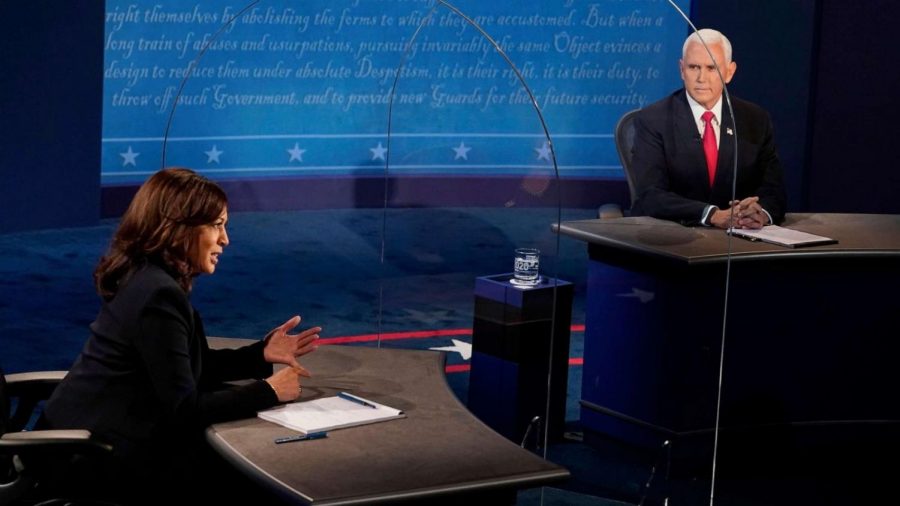Vice-Presidential Debate Recap
Kamala Harris and Mike Pence participate in their 2020 vice presidential campaign debate.
November 1, 2020
On Wednesday, October 7, 2020, Vice President, Mike Pence, and Democratic vice-presidential candidate, Kamala Harris, took the stage for the first and only vice-presidential debate in Salt Lake City, Utah. Considering the first presidential debate that took place the week before, which was described as “a hot mess inside a dumpster fire inside a train wreck” (Jake Tapper, CNN), the majority of Americans were anxious to watch the debate between Pence and Harris. Fortunately for its viewers, the debate was less chaotic and more civil than the presidential debate; granted, the bar was set incredibly low. Nevertheless, here are the main points you might have missed:
The first topic of the vice-presidential debate was coronavirus (COVID-19) and how Trump’s administration is managing the issue. Harris immediately noted the thousands of deaths in the United States that were a result of the pandemic, and she criticized Trump’s administration for failing to inform Americans of the severity of the virus as soon as it was known. In retaliation to Harris’ claim, Pence declared that Trump put the health of the people first by quarantining incoming Americans who tested positive for COVID-19 in March. Ultimately, Harris still suggested that Trump’s actions against the virus “clearly [haven’t] worked.”
Another major topic of discussion was climate change and fracking, also known as hydraulic fracturing. According to Dictionary.com, hydraulic fracturing is defined as the “process in which fractures in rocks below the earth’s surface are opened and widened by injecting chemicals and liquids at high pressure: used especially to extract natural gas or oil.” It is largely known that this method is extremely detrimental to the environment. However, it is also important to mention the fact that it keeps a large number of people employed; therefore, both Harris and Pence agreed that fracking would not be banned.
To the subject of Amy Coney Barrett being a potential Supreme Court nominee and the overturn of Roe V. Wade (which legalized abortion), Pence stated that he hopes Barrett will not be disregarded for her religious beliefs and will be treated the same as Brett Kavanaugh when he was nominated. In response, Harris voiced that she will always advocate for a woman’s freedom to make decisions about her own body, and Pence followed up by saying he will not apologize for being pro-life.
Near the end of the debate, Breonna Taylor, a Black woman shot by police, was mentioned. After both candidates gave their condolences, Harris explained that she did not feel justice was being made for Taylor, while Pence expressed that he “trusts the justice system” and that the assumption of racism and bias within the justice system is disrespectful. (It was also during this speech that a fly seated itself onto Pence’s snowy, white hair and remained there for two minutes straight.)
In conclusion, the vice-presidential debate was definitely more peaceful than the presidential debate, but Vijay Arora (12) pointed out that he was “a little upset that both sides kept avoiding questions. It’s really important to know where each administration stands on issues and how they will use their time in office.” Even so, Vijay still believes “it’s important for everyone to stay up to date and knowledgeable on politics” especially considering the upcoming presidential election.







































Blake Kingsbury • Dec 10, 2020 at 8:57 AM
This is a great recap of exactly how the VP debate went. It definitely felt more professional and respectful than the two presidential debates. I do wish both sides did not dodge as many questions as they did however.
Eunice Ahn • Nov 6, 2020 at 8:59 AM
Although the elections are almost over, I can’t help but feel upset how both sides are avoiding questions. I want answers from both sides that are clear and concise, it makes me wonder just what exactly are both sides hiding from us that they cannot share their thoughts. Overall, the vice presidential debate definitely went smoother than the presidential debate, and was definitely a bit more pleasant.
Paige Reddick • Nov 5, 2020 at 7:28 AM
This article perfectly explained the debate. It is extremely informative and highlights the key parts of the discussion!